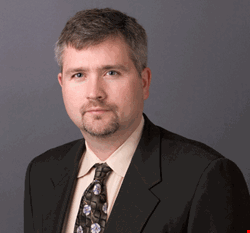

The term ‘utility player’, for those of you who may not be baseball fans, refers to a person who excels at numerous positions. It’s the type of player you can plug in and out of different spots, yet still receive the highest level of performance. It’s also an appropriate description of the skill set that Tom Kemp, CEO of security firm Centrify, brings to any organization.
During his nearly two decades in the Valley, Kemp has enjoyed the type of success that many only dream of. Yet, according to Kemp, his wife still wants him out of the house. Rather than taking it easy, Centrify’s CEO fancies himself a builder of sorts, one who takes pride in helping to create great companies born of fresh ideas.
Michigan Roots
I discovered an interesting little tidbit about Tom Kemp’s educational background. You see, he received degrees in both history and computer science from the University of Michigan, so I just had to know more about his time as a wolverine, and how someone can major in two seemingly unrelated disciplines.
“My father and mother went to the University of Michigan, and they were both history majors. I’m the middle of three brothers, and we all got history degrees”. Kemp then tells me that one of his nephews goes to the UofM, and that he will likely end up majoring in history. “I think the history is in our DNA”, he adds.
|
"I’d rather be at a company where all the employees see themselves as owners, and their actions can have material impact on the valuation of the company" |
With a senior thesis on the socioeconomic effects of the Civil War published by Cambridge University Press, Kemp could have gone after a career in academia. He decided, however, that history would likely not “pay the bills”. What Kemp did have was a similar interest in mathematics, which led to him simultaneously pursuing a degree in computer science.
“I think of myself more of a history person”, Kemp admits. While he respects the analytical skills required of computer science majors, he appreciates what the liberal arts background provided. It’s the communications skills he cites as most useful, especially considering his management roles.
Being a Michigan native, and UofM alum, it’s no surprise that Kemp is a fan of football. When I spoke with him this fall, Kemp had just returned from a trip to the Midwest, where he took in a game with is son in Detroit. Return trips to the upper Midwest are a frequent occurrence for the Kemp family. “The Midwest has a lot of stuff going for it, and it’s nice to see the weather changes – actual seasons.”
Kemp speaks with much affection for the Rust Belt he left behind, but calls the Valley “a pretty unique place. It’s kinda like Hollywood, where everyone walks around with a script”, Kemp says only half-jokingly. “In Silicon Valley, there’s a lot of people walking around with ideas for business.”
Regardless of his fondness for the changing seasons of Middle America, Kemp assures me that he’s more than happy living and working in the Valley, which he considers a dynamic environment focused on technology.
Start Me Up
Kemp’s passion for history, football, his roots, and his university, may be matched only by that of his enthusiasm for helping start-ups take off.
Before he set out as one of the co-founders of Centrify, Kemp experienced various measures of success in several different roles. Although he readily admits that Centrify is his first foray into security, Kemp is hardly a tech novice. He started out at Oracle, where he became a self-labeled “expert Oracle database tuner”. Less than four years after arriving at Oracle, it was time for Kemp to move on to Ecosystems Software, the first in Kemp’s string of start-up companies that have characterized most of his career.
Kemp tells me his role at Ecosystems involved “building systems management tools for Oracle and Unix systems”, moving on to product management and then sales management. “First I did technical marketing, then I did consulting, then I did sales”. The Centrify CEO was giving me just a taste of the variety that keeps him motivated on a daily basis.
Next up was a move to NetIQ, another start-up he signed on with – this time as a co-founder – in the mid nineties. Kemp speaks fondly of his time helping to get the systems management firm off the ground – it’s a feeling of accomplishment he reveals, while asserting his preference for smaller companies.
“I don’t see myself going to a big company, at least not for a long period of time”, Kemp says. “I’d rather be at a company where all the employees see themselves as owners, and their actions can have material impact on the valuation of the company, as opposed to being in a situation where, if I was working at a very large company, no matter how hard I work, it probably won’t materially impact the stock price.”
These were his thoughts when looking back on his time with NetIQ, which went public in 1999, much to the benefit of its growing staff. “Right time, right product, right people”, a reflective Kemp utters. “It really took a team effort to make things happen.”
|
"I kind of see myself as a serial entrepreneur" |
The concept of ‘team’ and ‘team building’ is what excites Kemp the most about helping a new idea take off. One of the biggest thrills he’s had so far in tech is building great teams that have gone on to do exceptional things. “Hopefully it will have an impact on customers”, he says, adding “but also hopefully it will have an impact on employees in terms of them being able to reach their goals and desires, both professionally as well as financially”.
Kemp, along with his co-founders, managed to assemble that winning team, as NetIQ grew from four people to more than 1500 during his eight-year tenure with the company. “I like building things; I get great joy out of building companies”, Kemp confides. Next up for this Silicon Valley renaissance man was the Centrify challenge.
Chapter 4: Centrify
With all of Kemp’s experience participating in start-up ventures, I just had to ask him, what makes the difference between successful ideas and dead-end ones? “You’ve got to ask yourself, is the timing right for this idea?”, he retorts. “Is the idea big enough that it could build a sustainable company? Another thing you’ve got to look at is how much competition is out there?”
Kemp needed to ask all these questions about his current venture, Centrify, and the concepts that are its bedrock. In Kemp’s assessment, what Centrify does is provide a solution to the chaos that is today’s computing environment.
“So the general idea behind Centrify was that the world is continuing to be more heterogeneous, in terms of the computing world”, he says, listing everything from iPhones and iPads to legacy Unix systems. What’s more, Kemp notes, is the explosion of applications, all written for various platforms.
“From an IT perspective, it’s not like the old days where you just had a mainframe and dumb terminals, or where you had just the Windows clients talking to Windows servers. The world is completely heterogeneous, and there’s significant concerns about who has access to all my systems and applications…concerns about giving end-users single sign on to all those disparate systems and applications.”
“The idea behind Centrify”, Kemp continues, “is we want to make a heterogeneous computing infrastructure look and feel and smell like it’s homogeneous from a core authentication, authorization, auditing perspective. What we decided to do, and part of this came from my background at NetIQ, where we were focused on the Windows space, is view Active Directory as a key piece of infrastructure that wasn’t going to go away.”
Kemp calls Active Directory the “security DNA behind the Windows platform”. Many organizations, however, use other identity stores for their Unix, Linux, and Mac systems, or for various applications. The brainchild of Centrify, Kemp says, was “an ability to let people leverage their existing Active Directory deployment and infrastructure and their skill set, and embrace and extend that across a heterogeneous environment”.
“[The] core of what we do is, we take a non-Microsoft system or application, and make it look and feel and smell like the Windows equivalent. Now [you can] use Active Directory as the central place for authentication and user administration, instead of having a different user name and password for each system or application out there.”
He calls it a replacement for all the sticky notes many people have littered around their monitors. “We give people one user name, one password, that will work today on premise.” Kemp believes this “heterogeneity” of the computing environment facilitates the ability to have a common set of policies across an enterprise, addresses compliance, makes both IT and staff more efficient, “and makes it a heck of a lot easier to secure it”.
The Serial Entrepreneur
I asked Kemp what the future may hold for both him and Centrify. Would he be seeking a buyer to get out and get started on his next venture?
“I’ve never been one to build companies to try to flip them”, he assures me. “I like building companies that have lasting value.”
For now, Kemp believes a likely exit may be an acquisition, but his company is not actively seeking such a move at the moment. He views the company going public as highly unlikely because, as he contends, “the IPO bar is so high and growing higher”.
Nevertheless, Centrify’s CEO says that if a Corleone-like figure emerged and made the company an offer it could not refuse, then all due consideration would be given. “In the meantime, we’re just heads down, building value, and continue to grow the market – and our presence in the market – to deliver more and more products.”
“I kind of see myself as a serial entrepreneur, and my next start-up company, after whenever we have a successful exit here, probably won’t be in security”, Kemp freely reveals, not afraid to make at least one forecast. “Maybe in my next company, I’ll do something in clean tech or whatever.”
But Kemp insists that an exit strategy is far from his mind at the moment, and that he’s willing to take his time with Centrify, finding full comfort with his track record of success. “Exits”, he says, “will take care of themselves”.